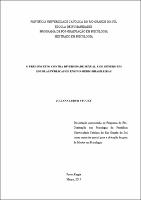| Share record |


|
Please use this identifier to cite or link to this item:
https://tede2.pucrs.br/tede2/handle/tede/7619| Document type: | Dissertação |
| Title: | O preconceito contra diversidade sexual e de gênero em escolas públicas de ensino médio brasileiras |
| Author: | Stucky, Juliana Ledur  |
| Advisor: | Costa, Ângelo Brandelli |
| Abstract (native): | Este estudo, realizado na Faculdade de Psicologia da Pontifícia Universidade Católica do Rio Grande do Sul, junto ao grupo de pesquisa Preconceito, Vulnerabilidade e Processos Psicossociais da unidade da Psicologia Social, teve como principal objetivo avaliar o grau de preconceito contra as diversidades sexuais e de gênero em 28 escolas públicas localizadas em 12 cidades de 4 estados brasileiros. Foram consideradas a maneira como o preconceito é expressado pelos/as professores/as, funcionários/as e estudantes, e a forma como o preconceito mostra-se em relação às variáveis sociodemográficas pesquisadas nessas três categorias de sujeitos. A amostra trabalhou com 413 professores/as, 97 funcionários/as e 1.829 estudantes de ensino médio que responderam um questionário autoaplicável com dados demográficos, a versão revisada da escala Preconceito contra Diversidade Sexual e de Gênero, composta por 16 itens, que investiga o preconceito contra diversidade sexual e de gênero, e a Escala de Distância Social de Bogardus, adaptada para investigar a relação com gays, lésbicas, travestis e transexuais. Pessoas que se consideraram religiosas e praticantes da religião evangélica, nos três grupos investigados, apresentaram maior grau de preconceito que as outras variáveis. Ter participado de algum treinamento, aula ou curso relacionado à identidade de gênero, sexualidade ou diversidade sexual diminui a frequência da variável preconceito, nos três grupos investigados. Pessoas que afirmaram possuir amigos/as, parentes ou conhecidos/as homossexuais (gays ou lésbicas), travestis ou transexuais, nos grupos de professores/as e alunos/as, apresentaram menor grau de preconceito que aquelas que responderam não se relacionar com nenhuma dessas pessoas. Auxiliar as equipes que integram as instituições de ensino brasileiras a pensar as múltiplas orientações sexuais e de gênero é o primeiro passo para propor mudanças pedagógicas e metodológicas nas escolas. A realização de campanhas e políticas que fomentem a problematização da discriminação, seus riscos e prejuízos para gerações presentes e futuras é fundamental, também, na busca por uma sociedade mais justa e equiparada nos direitos e obrigações individuais. |
| Abstract (english): | This paper prepared as part of the researches conducted by the Research Group Prejudice, Vulnerability and Psychosocial Process of the Psychology School of the Pontifícia Universidade Católica do Rio Grande do Sul – PUCRS, had the goal to evaluate the grades of prejudice against sexual and gender diversity within 28 public schools of 12 cities located in 4 Brazilian states. In this paper, it were considered the manners which prejudice is expressed by teachers, staff and students, and the form that the prejudice is shown in relation to the social demographics variables researched in those three categories of subjects. The sample was based on 413 teachers, 97 employees and 1.829 high school students that answered a selfexplanatory questionnaire with social demographic data, duly reviewed by the Prejudice against Sexual and Gender Diversity scales. The questionnaire was composed by 16 items that inquired about prejudice against sexual and gender diversity, and the Bogardus scale of social distance adapted to investigated the relation among gays, lesbian, travesties and transexuals. Individuals that declared to be religious or followers of the evangelic religion in the three groups of study presented a higher rate of prejudice than the other variables. The participation in any training, class or course related to gender, sexuality or sexual diversity decreases the prejudice variable in the three groups of study. Individuals that affirmed to have homosexual (gays and lesbians) friends, relatives or acquaintances in the groups of teachers and students presented a lower level of prejudice compared to the ones that declared to not have relationship with people with such characteristics. To assist individuals that are part of Brazilian education institutions to think about multiple sexual and gender orientations is the first step to propose institutional, pedagogical and methodological changes in schools. Campaigns and political actions that foster the problem of the prejudice, their risks and damages for current and future generations is also fundamental for the search of a more equal society in relation to the individual rights and obligations. |
| Keywords: | Preconceito Sexualidade Gênero Escolas Brasil |
| CNPQ Knowledge Areas: | CIENCIAS HUMANAS::PSICOLOGIA |
| Language: | por |
| Country: | Brasil |
| Publisher: | Pontifícia Universidade Católica do Rio Grande do Sul |
| Institution Acronym: | PUCRS |
| Department: | Escola de Humanidades |
| Program: | Programa de Pós-Graduação em Psicologia |
| Access type: | Acesso Aberto |
| URI: | http://tede2.pucrs.br/tede2/handle/tede/7619 |
| Issue Date: | 10-Mar-2017 |
| Appears in Collections: | Programa de Pós-Graduação em Psicologia |
Files in This Item:
| File | Description | Size | Format | |
|---|---|---|---|---|
| DIS_JULIANA_LEDUR_STUCKY_PARCIAL.pdf | Texto Parcial | 186.81 kB | Adobe PDF |  Download/Open Preview |
Items in DSpace are protected by copyright, with all rights reserved, unless otherwise indicated.




